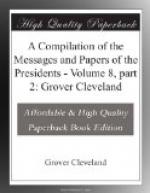By the law of Massachusetts, as that law stood before the act of the legislature of that State of the 24th of March, 1843, the common jails in the respective counties were to be used for the detention of any persons detained or committed by the authority of the courts of the United States, as well as by the courts and magistrates of the State. But these provisions were abrogated and repealed by the act of the legislature of Massachusetts of the 24th of March, 1843.
That act declares that—
No judge of any court of record of this Commonwealth and no justice of the peace shall hereafter take cognizance or grant a certificate in cases that may arise under the third section of an act of Congress passed February 12, 1793, and entitled “An act respecting fugitives from justice and persons escaping from the service of their masters,” to any person who claims any other person as a fugitive slave within the jurisdiction of the Commonwealth.
And it further declares that—
No sheriff, deputy sheriff, coroner, constable, jailer, or other officer of this Commonwealth shall hereafter arrest or detain, or aid in the arrest or detention or imprisonment, in any jail or other building belonging to this Commonwealth, or to any county, city, or town thereof, of any person for the reason that he is claimed as a fugitive slave.
And it further declares that—
Any justice of the peace, sheriff, deputy sheriff, coroner, constable, or jailer who shall offend against the provisions of this law by in any way acting, directly or indirectly, under the power conferred by the third section of the act of Congress aforementioned shall forfeit a sum not exceeding $1,000 for every such offense to the use of the county where said offense is committed, or shall be subject to imprisonment not exceeding one year in the county jail.
This law, it is obvious, had two objects. The first was to make it a penal offense in all officers and magistrates of the Commonwealth to exercise the powers conferred on them by the act of Congress of the 12th of February, 1793, entitled “An act respecting fugitives from justice and persons escaping from the service of their masters,” and which powers they were fully competent to perform up to the time of this inhibition and penal enactment; second, to refuse the use of the jails of the State for the detention of any person claimed as a fugitive slave.
It is deeply to be lamented that the purpose of these enactments is quite apparent. It was to prevent, as far as the legislature of the State could prevent, the laws of Congress passed for the purpose of carrying into effect that article of the Constitution of the United States which declares that “no person held to service or labor in one State, under the laws thereof, escaping into another, shall in consequence of any law or regulation therein be discharged from such service or labor, but shall be delivered up on




